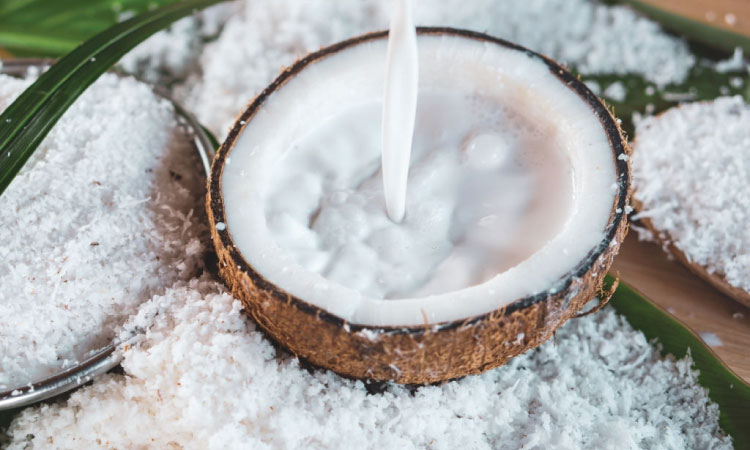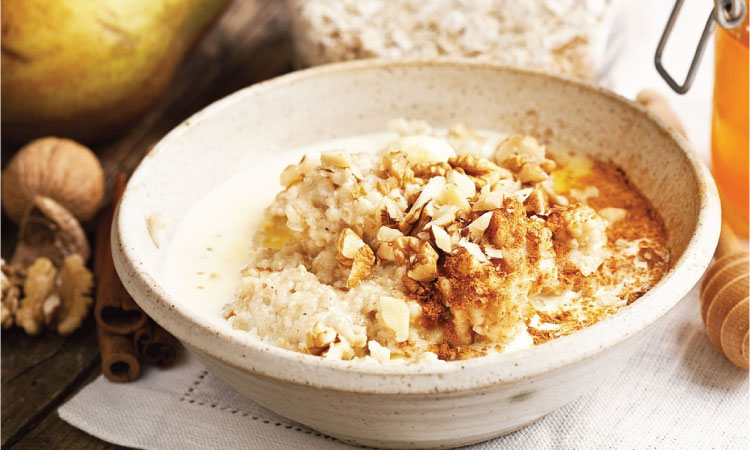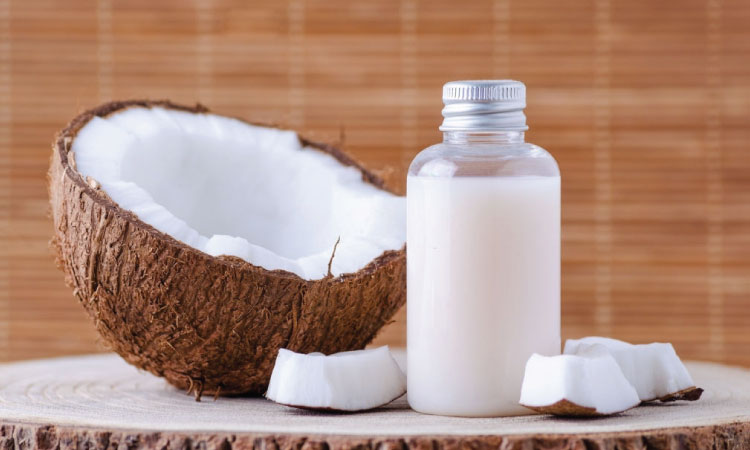Coconut milk is well- known for its nutritional and therapeutic properties. Coconut milk for babies, if introduced at right time has many advantages. However, many factors should be taken into consideration as well before offering coconut milk to babies. This article helps to clear some doubts of moms about introducing coconut milk to weaning babies.
What Is Coconut Milk?
Coconut milk is extracted from fresh coconut. It is a thick, opaque, and creamy white liquid. Usually, it is blended with water during the process of grinding the grated coconut and squeezing or pressing out the milk.
On the other hand, if grated coconut is steamed and grinded, or grinded without a drop of water, we will get coconut crème. Both coconut milk and coconut cream are the main ingredients in many south Indian dishes, widely used in Kerala cuisine. It is also a popular substitute for milk among vegans.
Coconut Milk For Babies – Nutritional Value
The nutritional composition and qualities of coconut milk usually depends on the quality of coconut pulp used. Therefore nutritional value might also slightly vary accordingly. The nutritional value and nutritional benefits of coconut milk for babies go like this:
- In terms of calories, coconut milk can be counted as high-calorie food. It also contains unique proteins that are highly beneficial for babies
- Coconuts contains remarkable amounts of fat. One cup of coconut milk (which is roughly 240 grams) contains 57 grams of fats!
- However, the majority of fat in coconut milk is in the form of medium-chain saturated fatty acids, which is a healthy form of fat
- One of the main fatty acids found in coconut milk is lauric acid. It is well-known for its antiviral and antibacterial properties. Moreover, it is a component of breast milk as well
- Coconut milk is rich in manganese, iron, magnesium, phosphorous, copper, and selenium
- Coconut milk is rich in antioxidants as well.
Is Coconut Milk Good for Babies?

Yes. Coconut milk is beneficial for babies. Many of its nutrients are good for the healthy development of the baby. It even contains one of the constituents of breast milk – Lauric acid. Coconut milk is highly beneficial for the brain development of the baby. It can do wonders for the baby’s skin as well.
However, even though coconut milk can be considered a superfood for babies, never consider it as a substitute for breast milk or formula. It lacks several vital nutrients present in breast milk or the formula.
Coconut Milk For Babies – What Is The Right Age To Start
Coconut milk benefits the baby only if it is started at right time and in the right manner. You can start to introduce the baby to coconut milk when he starts on solids. Whenever you plan to introduce this superfood to your little one, always start with a couple of spoons. You can increase the quantity step by step.
Also, never feed coconut milk directly; instead, use it while preparing other weaning foods like purees. You can give baby coconut milk once he is 8 months old. By this age, instead of cow or formula milk, you can use coconut milk in baby formula. By this age, you can use it while preparing rice or khichdi.
You must follow the three-day rule (never introduce the baby to another new food for three days after introducing a new food) when you introduce the baby to coconut milk. If the baby shows some signs of discomfort or allergy, never give him coconut milk without seeking an opinion from the doctor.
Once the baby turns one year, and no signs of allergy surface, you can replace one of his drinks with calcium-fortified coconut milk once in a week or so. You can occasionally feed them coconut milk-based yogurt, cheese or desserts as well
In any case, we strongly recommend consulting a pediatrician before giving any new food, including coconut milk to the baby.
How To Incorporate Coconut Milk In Baby’s Diet?
As already mentioned above, you can start incorporating coconut milk in the weaning food of the baby. As the baby grows, you can use it instead of water while boiling vegetables, fish, and chicken.
Once the baby turns one year, you can prepare mildly spiced stews and curries out of coconut milk. You can also prepare nutritious desserts and kheer with coconut milk for older babies. Coconut milk has light sweetness so while preparing desserts for babies; abstain from using lots of normal sugar. Instead, use palm sugar moderately.
What Are The Benefits Of Coconut Milk For Babies?

Some of the top benefits of coconut milk for babies are as follows:
1. Helps to improve digestion
Even though not clinically proven, coconut milk is believed to boost digestion and fight off constipation in babies. Coconut milk is high in water content and is also loaded with bioactive elements. It also contains enough electrolytes and healthy fat that aids in digestion.
2. May support brain development
Coconut milk contains significant amounts of saturated fatty acid. Around 65% of fatty acid in coconut is a healthy variation called MCT (medium-chain triglycerides). The baby’s body easily absorbs MCT in coconut milk. It then gets converted into ketones, which is counted as an energy source of the brain.
Fats are important for brain development. Coconut milk has a considerable amount of good fats. This helps with the baby’s brain development. During the initial years, the baby’s brain undergoes rapid development and coconut milk can give it a positive push. This is one of the important benefits of coconut milk for babies.
3. Helps with muscle development
Coconut milk is loaded with many vital minerals, vitamins, and nutrients. Many of these are beneficial for the overall growth and development of the baby. Coconut milk has a considerable amount of phosphorus and magnesium. These are essential for muscle development in babies.
4. Boosts immunity
Coconut milk contains vitamin C. it also contains bioactive components that have antioxidant properties. Medium-chain fatty acid like lauric acid in coconut milk helps to fight minor infections and ailments.
5. Helps to prevent anemia
Vitamin C in coconut milk helps with the repair and development of tissues and red blood cells. Also, one cup of coconut milk provides 25% of daily needed iron. Thus, coconut milk may help to prevent anemia in babies.
6. Helps with the skin health of the baby
Many mothers use coconut milk for baby skin whitening. They massage the baby with coconut milk before bath. Being rich in copper it is believed to help with the baby’s skin glow and colour.
A baby’s skin is not yet fully developed and therefore it is susceptible to rashes and infections. Climatic conditions like heat or cold and microbes like fungus and bacteria can take a toll on a baby’s skin. The antimicrobial property of coconut milk helps to protect the baby’s skin from bacterial and viral infections.
7. Helps with hair health of the baby
Coconut milk for babies’ hair is highly beneficial. Lauric acid is one of the main ingredients in coconut milk. It penetrates easily into the hair and helps strengthen the cuticle. Also, the protein in coconut milk is beneficial for the baby’s hair.
Theoretically, if applied to the baby’s hair, certain micronutrients found in coconut hair helps to moisturize them. Even though more studies have to conduct to prove this theory, there is enough to believe that massaging hair and scalp with coconut milk enhances the baby’s hair growth and scalp health.
What Are The Side Effects Of Coconut Milk For Babies?

Even though coconut milk carries many benefits, it can potentially bring about certain side effects as well. Therefore, you must not use it as a substitute for breast milk, cow’s milk, or formula. Instead, you can use it as one of the food items you offer the weaning baby.
Here are the reasons why you should not rely on coconut milk entirely for the baby’s nutrient requirement.
1. Protein content is not up to mark
Even though coconut milk is rich in proteins, it is way low when compared to other sources of milk like formula, breast milk, and cow’s milk. Protein is necessary for the healthy development of the tissues and muscles of the baby.
A baby needs a minimum of 11 grams of protein every day. But, 100 grams of coconut milk contains 2 grams of protein. Therefore, it is way low to satisfy the requirement of a growing baby.
2. May suppress baby’s appetite
Coconut milk is rich in saturated fat and calories. Therefore, coconut milk can make your little one feel full for a long time. This will suppress the appetite and they may refuse to eat other food or drink breast milk or formula.
Thus besides not providing all the essential nutrients for the baby coconut milk can hinder the intake of other nutrients rich food and drinks. This is not good for a developing baby. Therefore, it is always better to limit its intake.
3. Inadequate calcium content
Calcium is an essential element as far as the baby’s development is concerned. It is important for the healthy development of bone and teeth. Coconut milk barely provides 10% of the required calcium that your child needs.
Is Canned Coconut Milk Safe For Babies?
No, canned coconut milk is not a good option for babies. BPA (bisphenol-A) contamination is the primary concern when it comes to any canned products. To avoid corrosion all the cans of canned food have a lining of plastic on the inner surface.
This increases the chances of BPA contamination. It poses many health risks for the babies. Commercial coconut milk is also found to be too high in saturated fats. It might also contain artificial sweeteners, preservatives, or thickeners.
When it comes to a baby’s health, it is always better to use coconut milk extracted from a fresh coconut at home. Some parents opt to buy top brands of organic coconut milk for babies. We still recommend opting for homemade coconut milk over any type of coconut milk available in grocery stores or online stores.
Healthy Coconut Milk Recipes For Babies

Healthy coconut milk recipes can potentially improve the nutritional value of your baby’s diet. Find out some easy recipes with coconut milk for babies
1. Coconut milk puree (6 months+)
You can prepare this dish by adding two tablespoons of freshly pressed coconut milk to half a cup of any purees. Preferably, banana/mango/ apple purees.
2. Vegetable oats porridge with coconut milk (8 months+)
Take half a cup of roasted oats in a pressure cooker. Add half a cup of chopped mixed vegetables of your choice. We prefer carrots and potatoes. Add half a teaspoon of chopped garlic and cumin seed. Pour enough water. Make sure not to use too much water. Pressure cook in medium flame until two whistles come.
Once the pressure is released, mash it well. Now you will get a thick porridge. Now add two to three tablespoons of coconut milk to get the desired consistency.
Points To Remember While Choosing Coconut Milk For Babies
- Always rely on freshly prepared coconut milk
- Nevertheless, if you have to opt for packaged coconut milk for some reason, choose the milk from a reputed brand. In that case, opt for coconut milk fortified with calcium and vitamin D
- Only occasional intake of coconut milk is recommended for the toddler
- If your baby has any kind of allergy, it is better to ask the doctor before starting to include coconut milk into his diet

